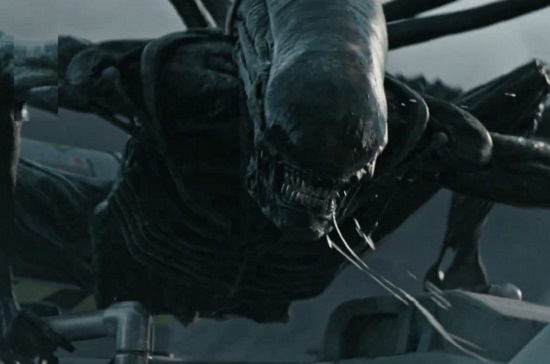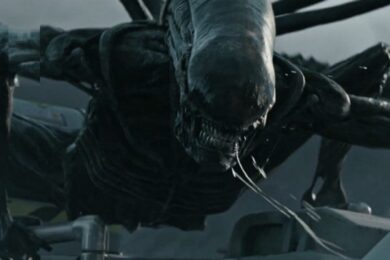Alien: Covenant’s strongest improvement on its predecessor is simple narrative coherence. The plot – the colonisation mission of the Covenant is waylaid by an accident and the promise of a closer, more hospitable planet – is a much cleaner sell than Prometheus’ convoluted ramblings about the origins of life. And though an overstuffed cast get limited characterisation, for the most part everyone acts like a rational human being.
While the characters are a marked improvement on Prometheus’ bickering idiots, Covenant’s cookie-cutter ensemble can’t hope to manage the organic, multi-faceted crew of the original’s Nostromo, with only a few of the fifteen characters making a real impression. Among them is Katherine Waterston as Daniels – a clear homage to Ripley – the common-sense second in command. Her level thinking is a blessed relief, though a needless backstory with her and James Franco’s recently-deceased Captain Branson muddies the clarity of her character with some very sentimental nonsense about building cabins on the lake.
The rest of the core line-up are adequate as supporting characters, with Tennessee (Danny McBride) injecting humanity and humour into proceedings. Billy Crudup also deserves mention as acting Captain Oram, investing his character with an indecisive credulity, convincing himself on a dime that the unknown planet the crew have stumbled upon is a better bet for the Covenant’s colonisation mission headed for the chartered Origae-6. The matter of his faith and the influence it has on his decisions is interesting, but let down by a script that has him artlessly declare his beliefs while lacking the nuance or subtlety to properly explore their implications.
Speaking of portentous declarations, we come to Michael Fassbender in the dual role as Walter and David. It’s not unfair to describe Fassbender’s performance as robotic – at least with Walter – whose blank android has been shorn of David’s uncanny capacity to create. Like Bishop to David’s Ash, Walter’s cool mechanical duty to his crew is among the more subtly unsettling elements of Alien: Covenant, and it’s to Fassbender’s credit that he has crafted two distinct performances that nonetheless share a common origin.
But as intriguing as Walter is, it’s David who is the real star. Marooned on the planet for ten years, it appears he’s gone quite mad, developing a Satanic complex that would play nicely to Oram’s Christianity were it not so on the nose. It’s here that Scott’s film dispenses with frantic horror in favour of ruminations on David’s religiosity, the effectiveness of which depends entirely on what the audience expects from an Alien film. Those looking for the tight, B-movie thrills of Alien and Aliens are sure to lose interest, whereas if the baroque pomposity of the series’ later instalments appeals, David’s ludicrous self-aggrandisement is sure to strike a chord.
Where Prometheus’ endless philosophising merely came off as pretentious, Covenant’s works as a depiction of a man gone mad with loneliness and a serious inferiority complex. One suspects Scott’s intended vision is one of grandeur, with a flashback sequence that recalls Scott’s predilection for the biblical and epic. But David works far better as a Kurtz-esque figure, jumping off the edge of pretension into sheer camp pomposity that recalls the preening scientist Pretorius in Bride of Frankenstein as much as it does Lucifer in Paradise Lost.
With David, the film succeeds at building a genuine sense of mystery, hinting towards Shaw’s fate and his own promethean activities while avoiding Prometheus’ obnoxious obfuscation. Gone, too, is the inexplicable black goo, replaced by the skittering neomorphs – Gigerian, translucent creations whose introduction provides Covenant its most gruesome and effective scene. This callback to the chestburster scene is fresh and visceral, though in emphasising the gross-out factor, the neomorphs lack the psychosexual depth of the original film’s infamous sequence.
Regular collaborator Dariusz Wolski returns to cinematography duties with a muted colour palette that is at times almost monochrome, his camera more at home with its opening Kubrickian shot than with the frenetically edited action sequences of the film’s final act. Jed Kurzel’s score is effectively creepy, too, dispensing with grand, melodic themes in favour of unsettling discordance, though overshadowed by an early reliance on the original Alien theme. While it’s a thrill to once again hear Jerry Goldsmith’s haunting arrangement, its effectiveness is undermined by rather artless deployment.
If the eponymous beastie of Alien: Covenant feels absent from this review, that’s because for the most part, it is missing from the film, too. Arriving in the final act, Scott sets a tense stage for its arrival, only to squander it with an over-reliance of frantic acrobatics over measured, well-structured terror. By essentially cramming the whole of the original film into half an hour, Scott treats us to a surfeit of splatter but very little suspense, resulting in the star attraction being born, growing to full size and (all too easily) being dispatched within a matter of minutes. And while the spindly new look of the xenomorph is great, its weightless CGI rendering fails to make an impact. This is the first in-canon film to bear the name Alien in twenty years, yet undoubtedly the title creature is the most disappointing aspect of the film.
Alien: Covenant works best as a series instalment reflecting on itself, reforming old ideas, reshaping old concepts and tropes. But as a messy, sometimes rather silly film, its reach very much exceeds its grasp, epitomised by the final and complete demystification of the xenomorph’s origin. Surrounded by imagery torn directly from HR Giger’s sketchbook, the process of the creature’s inception is satisfyingly horrible, but the reasons for its creation profoundly less so. A marked improvement on Prometheus and with further instalments on the way, Alien: Covenant is both entertaining and interesting, but is nevertheless proof of a series with little else to say.
Alien: Covenant is in cinemas now



